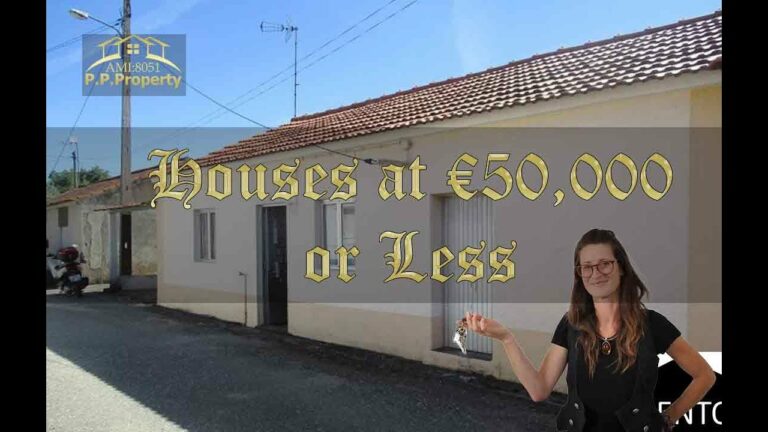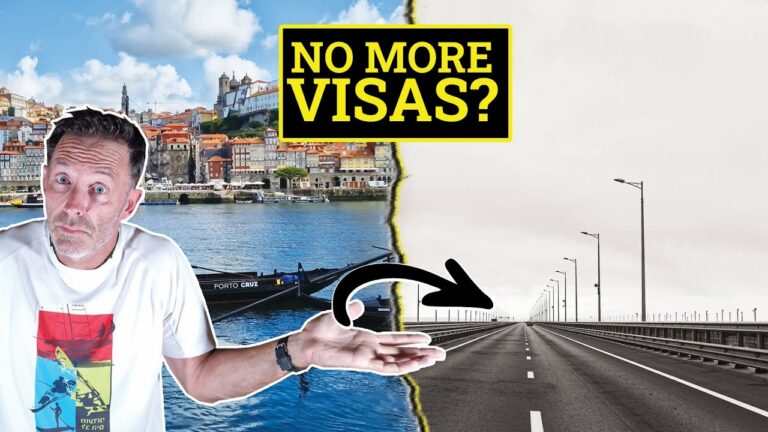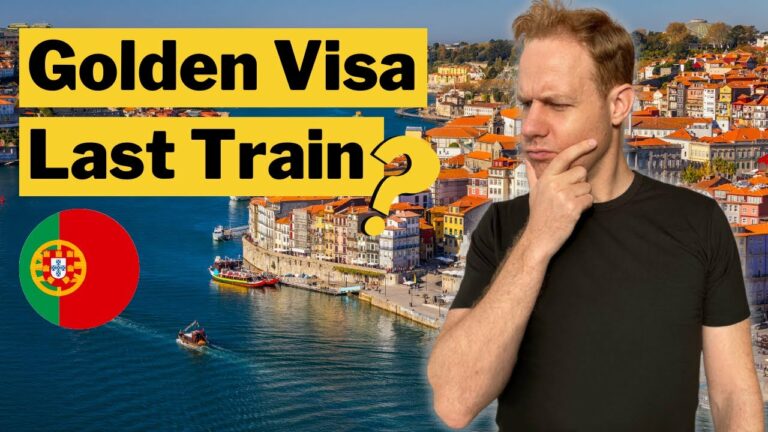Opportunities: D3 Visa Portugal Work Visa | GoldenVisaReviews.com
Are you dreaming of working in one of the most beautiful countries in Europe? Portugal may be the perfect place for you! As a blog traveller and expat myself, I’ve had my fair share of experiences with visas and work permits in various countries, but the D3 Visa in Portugal is one that stands out to me. This unique visa allows non-EU citizens to work remotely for companies outside of Portugal while living in this stunning country.
I remember the first time I heard about the D3 Visa – I was amazed that such a visa even existed. I had always wanted to live and work in Portugal, but the idea of finding a job in a foreign country and obtaining a work permit seemed daunting. However, with the D3 Visa, I was able to work for my company back home while enjoying the beautiful beaches, delicious food, and vibrant culture of Portugal.
But the benefits of the D3 Visa don’t stop there – it also allows you to apply for a residency permit after six months, making it a gateway to potentially obtaining permanent residency in Portugal. Additionally, Portugal has recently implemented a “digital nomad” tax regime, meaning that those who qualify for the D3 Visa may be eligible for a reduced tax rate of just 20%.
As a blogger and expat, I understand the challenges and rewards of moving and working abroad. That’s why I’m excited to share my insights and experiences with the D3 Visa in Portugal, and provide you with practical tips and advice on how to make the most of this unique opportunity. So, let’s dive in and explore everything you need to know about the D3 Visa in Portugal!
What are the benefits of D3 visa in Portugal?
If you’re considering moving to Portugal for work, you may have heard of the D3 visa. This is a specific type of visa designed for entrepreneurs and startup founders who want to establish their business in Portugal. In this article, we will explore the benefits of the D3 visa and how it can help you build your business in Portugal.
Easy and straightforward application process
The application process for the D3 visa is relatively easy and straightforward. Unlike other visas, the D3 visa is specifically designed for entrepreneurs and startup founders. This means that the application process is less complicated and more streamlined. Additionally, the Portuguese government has made it easy for applicants to submit their application online, meaning that you can complete the process from anywhere in the world.
No minimum investment requirement
One of the biggest benefits of the D3 visa is that there is no minimum investment requirement. This means that you don’t need to have a specific amount of money to invest in your business to be eligible for the visa. However, you will need to demonstrate that your business idea is viable and has the potential to create jobs in Portugal.
Access to the Portuguese market
By obtaining a D3 visa, you will have access to the Portuguese market. This means that you can establish your business in a country that is known for its strategic location, excellent infrastructure, and business-friendly environment. Additionally, Portugal has a thriving startup ecosystem, which means that you will have access to a community of like-minded individuals who can help you grow your business.
Flexibility to work and live in Portugal
The D3 visa allows you to work and live in Portugal for up to two years. After two years, you can apply for a renewal of your visa or apply for permanent residency. This gives you the flexibility to build your business and establish your life in Portugal without worrying about the stress of visa renewals.
Access to the EU market
As a member of the European Union, Portugal provides you with access to the EU market. This means that you can expand your business operations to other EU countries without worrying about additional visas or work permits. Additionally, Portugal has favorable tax laws for entrepreneurs, making it an attractive destination for those looking to establish their business in Europe.
In conclusion
The D3 visa is an excellent option for entrepreneurs and startup founders who want to establish their business in Portugal. With easy and straightforward application process, no minimum investment requirement, access to the Portuguese and EU markets, and flexibility to work and live in Portugal, the D3 visa provides entrepreneurs with an excellent opportunity to build their business in a thriving and business-friendly environment.
So, if you’re considering moving to Portugal for work, the D3 visa is definitely worth exploring. With a little bit of planning and preparation, you can establish your business in Portugal and take advantage of all the benefits that this beautiful country has to offer.
What is a D3 visa in Portugal?
If you’re considering a move to Portugal, you’ll need to understand the different types of visas available. One option that may be of interest to you is the D3 visa, also known as the “start-up visa” or “entrepreneur visa”.
The D3 visa is designed for individuals who wish to establish or invest in a start-up company in Portugal. This visa allows you to live and work in Portugal for up to two years, with the possibility of renewal for an additional three years.
To be eligible for a D3 visa in Portugal, you must meet a few requirements. Firstly, you must have a business plan for a start-up company that has the potential to create jobs and contribute to the Portuguese economy. You’ll also need to show that you have sufficient funds to support yourself during your stay in Portugal.
In addition to the above requirements, you’ll need to provide the following documentation when applying for a D3 visa in Portugal:
– Valid passport
– Proof of health insurance
– Criminal background check
– Proof of financial means to support yourself
– Business plan for your start-up company
– Proof that your company has been registered with the Portuguese authorities
It’s important to note that the D3 visa is not a permanent residency visa, but it does offer a pathway to obtaining a permanent residency permit in Portugal. After five years of living in Portugal on a D3 visa, you may be eligible to apply for a permanent residency permit.
If you’re considering applying for a D3 visa in Portugal, it’s important to work with an experienced immigration lawyer or consultant who can guide you through the application process and help ensure that you meet all of the necessary requirements.
While the application process can be daunting, with the right preparation and guidance, you can successfully obtain a D3 visa and begin your new life in Portugal.
What is the difference between D1 and D3 visa in Portugal?
If you’re considering a move to Portugal, you may have heard about the D1 and D3 visas. These are both types of visas that allow foreigners to live and work in Portugal, but they have some key differences. In this article, we’ll explore what sets the D1 and D3 visas apart, and help you determine which one is right for you.
D1 Visa: Residence Visa for Investment Activity
The D1 visa is also known as the Residence Visa for Investment Activity. As the name suggests, this visa is designed for individuals who want to invest in Portugal. To qualify for a D1 visa, you must meet certain investment requirements, which vary depending on the type of investment you plan to make.
For example, if you plan to invest in real estate, you must purchase a property worth at least €500,000. If you plan to start a business in Portugal, you must create at least 10 jobs for Portuguese citizens. There are also options for investing in research and development, cultural heritage, and more.
Once you have made the required investment, you can apply for a D1 visa. This visa allows you to live and work in Portugal for up to two years, and can be renewed for additional periods of two years each. After five years, you may be eligible for permanent residency or citizenship.
D3 Visa: Work Visa
The D3 visa, on the other hand, is a Work Visa. This visa is designed for individuals who have a job offer from a Portuguese employer. To qualify for a D3 visa, you must have a contract of employment in Portugal for at least six months, and you must have the necessary qualifications and experience to perform the job.
Unlike the D1 visa, the D3 visa does not require any investment in Portugal. However, you must have a job offer in order to apply for this visa. Once you have the visa, you can live and work in Portugal for the duration of your contract.
Which Visa is Right for You?
Deciding between the D1 and D3 visa depends on your individual circumstances. If you have the means to invest in Portugal and want to start a business or purchase property, the D1 visa may be the right choice for you. On the other hand, if you have a job offer in Portugal and want to work for a Portuguese employer, the D3 visa is the way to go.
It’s also worth noting that there are other types of visas available for individuals who want to live and work in Portugal, such as the Golden Visa and the Entrepreneur Visa. These visas have their own sets of requirements and benefits, so it’s important to do your research and determine which one is the best fit for your goals.
Can I work in Portugal with D2 visa?
Many people dream of living and working in Portugal, with its beautiful beaches, vibrant cities, and rich culture. However, before making the move, it’s important to understand the visa requirements and regulations for working in the country. One visa option that is often considered is the D2 visa, also known as the investor visa. But can you work in Portugal with a D2 visa? Let’s take a closer look.
What is a D2 Visa?
The D2 visa, or investor visa, is a type of visa that allows non-EU citizens to move to Portugal for investment purposes. In order to apply for the D2 visa, you must invest a minimum of €250,000 in Portugal, either by starting a business or buying property. The visa is initially valid for one year, and can be renewed for two-year periods.
Can You Work in Portugal with a D2 Visa?
While the D2 visa does allow you to live in Portugal, it does not automatically grant you the right to work in the country. In order to work in Portugal, you will need to apply for a work permit. This can be done through your employer, who will need to provide proof that no Portuguese nationals are available to fill the position you are applying for.
If you are planning on starting your own business in Portugal, you may be able to work for that business without a work permit. However, this will depend on the type of business you are starting and the specific requirements of the D2 visa.
Consider the D3 Visa for Work in Portugal
If your main goal is to work in Portugal, rather than investing, you may want to consider the D3 visa instead. This visa is specifically designed for non-EU citizens who want to work in Portugal. In order to be eligible for the D3 visa, you will need to have a job offer from a Portuguese employer.
Once you have the D3 visa, you will be able to work in Portugal for the duration of the visa. After two years, you may be eligible for permanent residency in Portugal. This can be a great option for those who want to live and work in Portugal long-term.
Final Thoughts
While the D2 visa may seem like an attractive option for those who want to live in Portugal, it’s important to understand that it does not automatically grant you the right to work in the country. If your main goal is to work in Portugal, you may want to consider the D3 visa instead. Regardless of which visa you choose, it’s important to do your research and understand the requirements and regulations before making the move.
the D3 Visa Portugal Work Visa is a great option for those who wish to work and live in Portugal. As an expat, I have come to appreciate the warm and friendly culture of the Portuguese people, as well as the country’s rich history and diverse events. The investment opportunities and legal aspects of obtaining a visa or citizenship program can be complex, but with the right guidance, they can lead to a fulfilling and exciting expat life. I encourage anyone who is considering a move to Portugal to explore the D3 Visa and the many benefits it provides. With hard work, determination, and a little bit of luck, you too can join the vibrant expat community in Portugal and experience all that this beautiful country has to offer.






